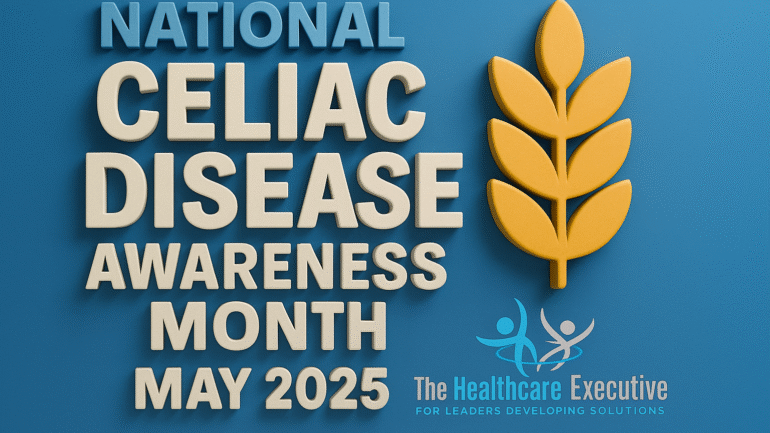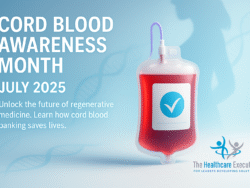National Celiac Disease Awareness Month – May 2025

- Posted by Greg Wahlstrom, MBA, HCM
- Posted in Health Observance Calendar
Executive Strategies for GI Care and Patient Education
Published: May 2, 2025
Each May, National Celiac Disease Awareness Month prompts hospitals and healthcare organizations to reflect on the state of gastrointestinal health across the United States. Celiac disease, an autoimmune disorder triggered by gluten, affects approximately 1 in 100 people worldwide—yet many remain undiagnosed or misdiagnosed. For hospital executives, this presents an opportunity to sharpen diagnostic strategies, expand dietary education services, and align care pathways for patients with chronic GI disorders. Celiac disease is not merely a dietary inconvenience; it is a systemic condition with long-term health consequences including malnutrition, infertility, neurological disorders, and increased cancer risk. Boards of directors must be aware that improving detection and care for celiac patients can significantly enhance quality-of-life outcomes while simultaneously reducing misdirected utilization. Hospitals can integrate EHR screening prompts to assess risk during intake, ensuring patients exhibiting classic or atypical symptoms are tested appropriately. For rural and community hospitals, awareness month campaigns offer an avenue to promote dietary guidance and raise clinical confidence in primary care providers. Partnerships with dietitians and local grocery retailers can also increase community access to gluten-free options. As chronic disease prevalence rises, Celiac Disease Awareness Month becomes a crucial marker in hospital engagement strategy and community trust-building. Thus, it is a moment not only for education—but for systems-level advancement.
Healthcare organizations that lead in gastrointestinal (GI) care are taking a multidisciplinary, patient-centered approach to managing celiac disease and related conditions. Mayo Clinic, for example, has embedded GI nutrition specialists and mental health professionals within their celiac programs, acknowledging the complex emotional and behavioral toll gluten intolerance can bring. Similarly, Children’s Hospital of Philadelphia (CHOP) has pioneered pediatric diagnostic protocols that reduce time-to-diagnosis and empower families to manage the disease holistically. These models reinforce the executive imperative to invest in GI subspecialties and preventive education as an organizational differentiator. Beyond the clinical setting, Celiac Disease Awareness Month presents a platform for hospitals to support caregivers, provide cooking demonstrations, and host virtual Q&A sessions with GI experts. Hospitals that serve large immigrant, refugee, or underserved populations should also consider how cultural food practices intersect with gluten restrictions. When leadership prioritizes inclusive education, healthcare equity improves. Strategic communications, including multilingual materials and mobile-friendly resources, allow hospitals to extend their impact beyond facility walls. It is this layered approach—clinical, cultural, and community-based—that distinguishes forward-thinking systems. Executives should evaluate how well their institutions are positioned to deliver such care and whether Celiac Disease Awareness Month is reflected in their outreach plans and budget priorities.
From a financial perspective, improved celiac care delivery aligns with both quality metrics and reimbursement models tied to value-based care. Patients with untreated or improperly managed celiac disease are more likely to incur complications that lead to increased ER visits, inpatient stays, and long-term medication needs. By refining screening and follow-up protocols, hospitals can reduce avoidable readmissions and better manage resource utilization. The Centers for Medicare & Medicaid Services (CMS) supports preventive nutrition counseling under specific CPT codes, making dietitian access more affordable and feasible for many patients. Executives should also consider leveraging their data analytics teams to identify trends in GI complaints that may signal undiagnosed celiac cases. Cross-functional review committees composed of GI, nutrition, and care management leaders can serve as valuable internal accelerators for change. This month is also an ideal time to review gluten-safe kitchen protocols within foodservice departments, ensuring alignment with Joint Commission standards and patient safety regulations. Hospitals with teaching programs can integrate celiac-specific modules into continuing education for staff and residents. In an era of consumerism, patients are seeking providers that understand their dietary challenges and deliver compassionate, evidence-based care. Therefore, Celiac Disease Awareness Month should be viewed not only as a compliance opportunity—but as a brand trust accelerator.
At a broader level, hospital boards and CEOs have a moral and operational responsibility to elevate awareness around chronic, often invisible illnesses like celiac disease. The executive suite must resist the assumption that food-related disorders are minor or less deserving of innovation. Instead, they should be viewed as strategic indicators of system responsiveness, especially when patients face lifelong dietary restrictions. Partnerships with national nonprofits like Beyond Celiac or the Celiac Disease Foundation can enhance a hospital’s credibility and provide access to pre-vetted resources. Boards should ensure their strategic plans include touchpoints for food insecurity, cultural barriers, and autoimmune disorders—all of which intersect with celiac awareness. Additionally, executives must ask whether their system’s telehealth offerings support follow-up appointments with GI nutritionists or if such services are inaccessible to vulnerable patients. Every hospital touchpoint—from diagnosis to dietary support—must reflect an intentional, coordinated approach to managing this disease. Celebrating Celiac Disease Awareness Month is not just about checking a box on a calendar. It’s about standing with patients who navigate this disease daily and reexamining how well institutions support them. The most respected hospitals are those that engage observances with authenticity, action, and ongoing accountability.
National Celiac Disease Awareness Month in May 2025 provides a leadership inflection point for hospitals to enhance GI care, embrace dietary inclusion, and advance organizational credibility. Executives who champion such efforts signal their institutions’ readiness to meet emerging clinical and consumer expectations. By aligning patient care models with community needs, the C-suite demonstrates strategic maturity and public health stewardship. Initiatives launched this month can serve as the foundation for broader conversations around chronic illness management, nutritional care, and inclusive food service protocols. Hospitals can reinforce their value to the community by using May 2025 as a springboard for stronger partnerships, smarter data, and more compassionate service design. Board discussions should move beyond awareness toward measurable outcomes and embedded commitments. Just as gluten-free diets require daily vigilance, system change requires ongoing leadership clarity. When hospitals lead with empathy, strategy, and precision, awareness becomes transformation. Celiac Disease Awareness Month offers the platform—what happens next depends on executive action. The Healthcare Executive encourages all systems to seize the moment and lead with intention.
Discover More
Hospital leaders should use this month to audit their celiac disease strategy, enhance dietary support programs, and engage staff in culturally competent care delivery. Strategic awareness drives measurable results.
Related Internal Articles
- Advancing Health Equity Through Strategic Initiatives
- Hospital Leadership in Crisis: What Every CEO Must Do in 2025
- The CEO’s Guide to Value-Based Care in 2025



